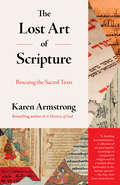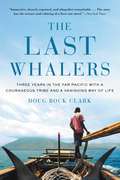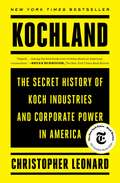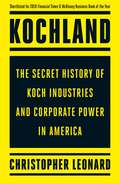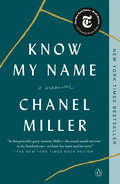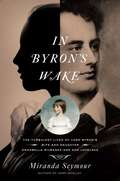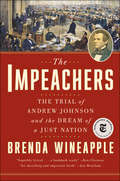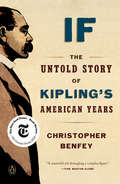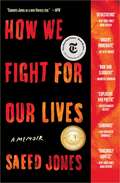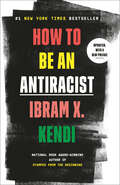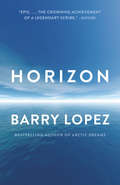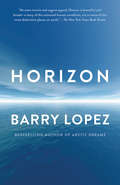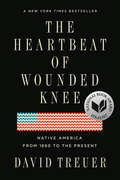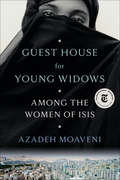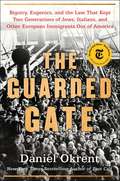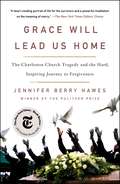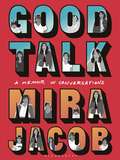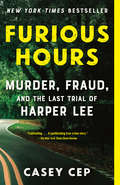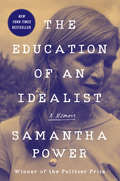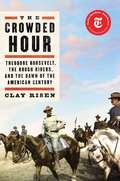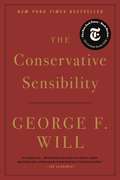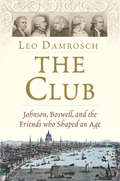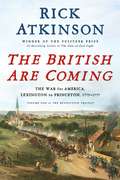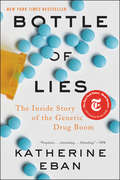Special Collections
100 Notable Books of 2019
- Table View
- List View
The Lost Art of Scripture
by Karen ArmstrongA book that shines fresh light on the world's major religions to help us build bridges between faiths and rediscover a creative and spiritual engagement with holy texts—from the New York Times bestselling author of A History of God&“[An] unusual, often dazzling, blend of theology, history, and neuroscience&” —The New YorkerThe significance of scripture may not be immediately obvious in our secular world, but its misunderstanding is perhaps the root cause of many of today's controversies. The sacred texts have been co-opted by fundamentalists, who insist that they must be taken literally, and by others who interpret scripture to bolster their own prejudices. These texts are seen to prescribe ethical norms and codes of behavior that are divinely ordained: they are believed to contain eternal truths. But as Karen Armstrong shows in this chronicle of the development and significance of major religions, such a narrow, peculiar reading of scripture is a relatively recent, modern phenomenon. For most of their history, the world's religious traditions have regarded these texts as tools that enable the individual to connect with the divine, to experience a different level of consciousness, and to help them engage with the world in more meaningful and compassionate ways.
The Lost Art of Scripture
by Karen ArmstrongIn this timely and important book, one of the world's leading commentators on religious affairs examines the lost art of Scripture as a medium to lift humanity and change our perception of reality while evading logical explanation. Today the Quran is used by some to justify war and acts of terrorism, the Torah to deny Palestinians the right to live in the Land of Israel, and the Bible to condemn homosexuality and contraception. The significance of Scripture--the holy texts at the centre of all religious traditions--may not be immediately obvious in our secular world but its misunderstanding is perhaps the root cause of most of today's controversies over religion. In this timely and important book, one of the world's leading commentators on religious affairs examines the meaning of Scripture. Today holy texts are not only used selectively to underwrite sometimes arbitrary and subjective views: they are seen to prescribe ethical norms and codes of behaviour that are divinely ordained--they are believed to contain eternal truths. But as Karen Armstrong shows in this fascinating trawl through millennia of religious history, this peculiar reading of Scripture is a relatively recent, modern phenomenon--and in many ways, a reaction to a hostile secular world. For most of their history, the world's religious traditions have regarded these texts as tools for the individual to connect with the divine, to transcend their physical existence, and to experience a higher level of consciousness that helped them to engage with the world in more meaningful and compassionate ways. Scripture was not a "truth" that had to be "believed." Armstrong argues that only if the world's religious faiths rediscover such an open and spiritual engagement with their holy texts can they curtail the arrogance, intolerance and violence that flows from a narrow reading of Scripture as truth.
The Last Whalers
by Doug Bock ClarkOn a volcanic island in the Savu Sea so remote that other Indonesians call it "The Land Left Behind" live the Lamalerans: a tribe of 1,500 hunter-gatherers who are the world's last subsistence whalers. They have survived for half a millennium by hunting whales with bamboo harpoons and handmade wooden boats powered by sails of woven palm fronds.
But now, under assault from the rapacious fores of the modern era and a global economy, their way of life teeters on the brink of collapse.
Award-winning journalist Doug Bock Clark, one of a handful of Westerners who speak the Lamaleran language, lived with the tribe across three years, and he brings their world and their people to vivid life in this gripping story of a vanishing culture. Jon, an orphaned apprentice whaler, toils to earn his harpoon and provide for his ailing grandparents, while Ika, his indomitable younger sister, is eager to forge a life unconstrained by tradition, and to realize a star-crossed love. Frans, an aging shaman, tries to unite the tribe in order to undo a deadly curse. And Ignatius, a legendary harpooner entering retirement, labors to hand down the Ways of the Ancestors to his son, Ben, who would secretly rather become a DJ in the distant tourist mecca of Bali.
Deeply empathetic and richly reported, The Last Whalers is a riveting, powerful chronicle of the collision between one of the planet's dwindling indigenous peoples and the irresistible enticements and upheavals of a rapidly transforming world.
Kochland
by Christopher LeonardNEW YORK TIMES BESTSELLER * NEW YORK TIMES NOTABLE BOOK OF 2019 * WINNER OF THE J ANTHONY LUKAS WORK-IN-PROGRESS AWARD * FINANCIAL TIMES&’ BEST BOOKS OF 2019 * NPR FAVORITE BOOKS OF 2019 * FINALIST FOR THE FINACIAL TIMES/MCKINSEY BUSINESS BOOK OF 2019 * KIRKUS REVIEWS BEST BOOKS OF 2019 * SCHOOL LIBRARY JOURNAL BEST BOOKS OF 2019 &“Superb…Among the best books ever written about an American corporation.&” —Bryan Burrough, The New York Times Book Review Just as Steve Coll told the story of globalization through ExxonMobil and Andrew Ross Sorkin told the story of Wall Street excess through Too Big to Fail, Christopher Leonard&’s Kochland uses the extraordinary account of how one of the biggest private companies in the world grew to be that big to tell the story of modern corporate America.The annual revenue of Koch Industries is bigger than that of Goldman Sachs, Facebook, and US Steel combined. Koch is everywhere: from the fertilizers that make our food to the chemicals that make our pipes to the synthetics that make our carpets and diapers to the Wall Street trading in all these commodities. But few people know much about Koch Industries and that&’s because the billionaire Koch brothers have wanted it that way. For five decades, CEO Charles Koch has kept Koch Industries quietly operating in deepest secrecy, with a view toward very, very long-term profits. He&’s a genius businessman: patient with earnings, able to learn from his mistakes, determined that his employees develop a reverence for free-market ruthlessness, and a master disrupter. These strategies made him and his brother David together richer than Bill Gates. But there&’s another side to this story. If you want to understand how we killed the unions in this country, how we widened the income divide, stalled progress on climate change, and how our corporations bought the influence industry, all you have to do is read this book. Seven years in the making, Kochland &“is a dazzling feat of investigative reporting and epic narrative writing, a tour de force that takes the reader deep inside the rise of a vastly powerful family corporation that has come to influence American workers, markets, elections, and the very ideas debated in our public square. Leonard&’s work is fair and meticulous, even as it reveals the Kochs as industrial Citizens Kane of our time&” (Steve Coll, Pulitzer Prize–winning author of Private Empire).
Kochland
by Christopher Leonard‘A landmark book....A massively reported deep dive into the unparalleled corporate industrial giant Koch Industries....This impressively researched and well-rendered book also serves as a biography of Charles Koch, with Leonard providing an evenhanded treatment of the tycoon. Leonard's work is on par with Steve Coll's Private Empire and even Ida Tarbell's enduring classic The History of the Standard Oil Company.’ Kirkus Reviews ‘Leonard’s superb investigations and even-handed, clear-eyed reportage stand out....American capitalism at its most successful and domineering is at the center of this sweeping history of a much-vilified company.’ Publishers Weekly ‘Leonard’s intricately developed and extensively researched history of the Koch empire is a colossal corporate biography that sheds important light on this closely guarded enterprise while simultaneously scrutinizing the nefarious underpinnings of American economic policies and practices.’ Booklist ‘This page-turning exposé reveals the full extent of the Koch brothers’ influence on American capitalism.’ Book Riot ‘If you want a crash course in the evolution of postmodern capitalism over the last five decades read Kochland....Leonard's study is exhaustive and engaging.’ New York Journal of Books The annual revenue of Koch Industries is bigger than that of Google, Goldman Sachs and Kraft Foods combined. But very few people have ever heard of Koch Industries because the billionaire Koch brothers want it that way. Now, in Kochland, Christopher Leonard has managed what no other journalist has done before: to tell the explosive inside story of how the largest private company in the world became that big. In doing so, Leonard also tells the epic tale of the evolution of corporate America over the last half-century, in all its glory and rapaciousness. Koch is everywhere. It controls the fertilisers at the foundation of our food system. It controls the synthetics that make our diapers and carpets. It controls the chemicals that make our bottles and pipes. It controls the building materials that make our homes and offices. And it controls much of the Wall Street trading in all of these commodities. It makes money at every end of almost every deal. For five decades, CEO Charles Koch has kept Koch Industries quietly operating behind a veil of secrecy, with a view toward very, very long-term profits. When Wall Street came calling twenty years ago, trying to take Koch public, Charles Koch said no. He’s a genius businessman: patient with profits, able to learn from his mistakes, determined that his employees develop an almost a worshipful dedication to free-market ruthlessness, and a master disrupter. We think of disruption as something that happens in Silicon Valley, but this book will upend your understanding of what disruption really is. Charles Koch’s business acumen has made him and his brother David (Koch Industries’ co-owner) together richer than Bill Gates. But there’s a dark side to their story. If you want to understand how we killed the unions in this country, how we widened the income divide, how we stalled progress on climate change and how corporate America bought the influence industry, all you have to do is read this book. Seven years in the making, Kochland reads like a true-life thriller, with larger-than-life characters driving the battles on every page. The book tells the ambitious tale of how one private company consolidated power over half a century – and how in doing so, transformed capitalism into something that feels so deeply alienating to many Americans today.
Know My Name
by Chanel MillerThe riveting, powerful memoir of the woman whose statement to Brock Turner gave voice to millions of survivors
She was known to the world as Emily Doe when she stunned millions with a letter. Brock Turner had been sentenced to just six months in county jail after he was found sexually assaulting her on Stanford's campus.
Her victim impact statement was posted on BuzzFeed, where it instantly went viral--viewed by eleven million people within four days, it was translated globally and read on the floor of Congress; it inspired changes in California law and the recall of the judge in the case. Thousands wrote to say that she had given them the courage to share their own experiences of assault for the first time.
Now she reclaims her identity to tell her story of trauma, transcendence, and the power of words. It was the perfect case, in many ways--there were eyewitnesses, Turner ran away, physical evidence was immediately secured. But her struggles with isolation and shame during the aftermath and the trial reveal the oppression victims face in even the best-case scenarios.
Her story illuminates a culture biased to protect perpetrators, indicts a criminal justice system designed to fail the most vulnerable, and, ultimately, shines with the courage required to move through suffering and live a full and beautiful life.
Know My Name will forever transform the way we think about sexual assault, challenging our beliefs about what is acceptable and speaking truth to the tumultuous reality of healing. It also introduces readers to an extraordinary writer, one whose words have already changed our world. Entwining pain, resilience, and humor, this memoir will stand as a modern classic.
A New York Times Bestseller
In Byron's Wake
by Miranda SeymourA masterful portrait of two remarkable women, revealing how two turbulent lives were always haunted by the dangerously enchanting, quicksilver spirit of that extraordinary father whom Ada never knew: Lord Byron. In 1815, the clever, courted, and cherished Annabella Milbanke married the notorious and brilliant Lord Byron. Just one year later, she fled, taking with her their baby daughter, the future Ada Lovelace. Byron himself escaped into exile and died as a revolutionary hero in 1824, aged 36. The one thing he had asked his wife to do was to make sure that their daughter never became a poet. Ada didn’t. Brought up by a mother who became one of the most progressive reformers of Victorian England, Byron’s little girl was introduced to mathematics as a means of calming her wild spirits. Educated by some of the most learned minds in England, she combined that scholarly discipline with a rebellious heart and a visionary imagination. As a child invalid, Ada dreamed of building a steam-driven flying horse. As an exuberant and boldly unconventional young woman, she amplified her explanations of Charles Babbage’s unbuilt calculating engine to predict—as nobody would do for another century—the dawn of the modern computer age. When Ada died—like her father, she was only 36—great things seemed still to lie ahead for her as a passionate astronomer. Even while mired in debt from gambling and crippled by cancer, she was frenetically employing Faraday’s experiments with light refraction to explore the analysis of distant stars. Drawing on fascinating new material, Seymour reveals the ways in which Byron, long after his death, continued to shape the lives and reputations both of his wife and his daughter. During her life, Lady Byron was praised as a paragon of virtue; within ten years of her death, she was vilified as a disgrace to her sex. Well over a hundred years later, Annabella Milbanke is still perceived as a prudish wife and cruelly controlling mother. But her hidden devotion to Byron and her tender ambitions for his mercurial, brilliant daughter reveal a deeply complex but unexpectedly sympathetic personality. Miranda Seymour has written a masterful portrait of two remarkable women, revealing how two turbulent lives were often governed and always haunted by the dangerously enchanting, quicksilver spirit of that extraordinary father whom Ada never knew.
The Impeachers
by Brenda Wineapple“This absorbing and important book recounts the titanic struggle over the implications of the Civil War amid the impeachment of a defiant and temperamentally erratic American president.”—Jon Meacham, Pulitzer Prize–winning author of The Soul of America When Abraham Lincoln was assassinated and Vice-President Andrew Johnson became “the Accidental President,” it was a dangerous time in America. Congress was divided over how the Union should be reunited: when and how the secessionist South should regain full status, whether former Confederates should be punished, and when and whether black men should be given the vote. Devastated by war and resorting to violence, many white Southerners hoped to restore a pre–Civil War society, if without slavery, and the pugnacious Andrew Johnson seemed to share their goals. With the unchecked power of executive orders, Johnson ignored Congress, pardoned rebel leaders, promoted white supremacy, opposed civil rights, and called Reconstruction unnecessary. It fell to Congress to stop the American president who acted like a king. With profound insights and making use of extensive research, Brenda Wineapple dramatically evokes this pivotal period in American history, when the country was rocked by the first-ever impeachment of a sitting American president. And she brings to vivid life the extraordinary characters who brought that impeachment forward: the willful Johnson and his retinue of advocates—including complicated men like Secretary of State William Seward—as well as the equally complicated visionaries committed to justice and equality for all, like Thaddeus Stevens, Charles Sumner, Frederick Douglass, and Ulysses S. Grant. Theirs was a last-ditch, patriotic, and Constitutional effort to render the goals of the Civil War into reality and to make the Union free, fair, and whole.Advance praise for The Impeachers “In this superbly lyrical work, Brenda Wineapple has plugged a glaring hole in our historical memory through her vivid and sweeping portrayal of President Andrew Johnson’s 1868 impeachment. She serves up not simply food for thought but a veritable feast of observations on that most trying decision for a democracy: whether to oust a sitting president. Teeming with fiery passions and unforgettable characters, The Impeachers will be devoured by contemporary readers seeking enlightenment on this issue. . . . A landmark study.”—Ron Chernow, Pulitzer Prize–winning author of Grant
If
by Christopher BenfeyA unique exploration of the life and work of Rudyard Kipling in Gilded Age America, from a celebrated scholar of American literature At the turn of the twentieth century, Rudyard Kipling towered over not just English literature, but the entire literary world. At the height of his fame in 1907, he was awarded the Nobel Prize for Literature, becoming its youngest winner. His influence on figures—including the likes of Freud and William James—was vast and profound. But in recent decades Kipling’s reputation has suffered a strange eclipse. Though his body of work still looms large, and his monumental poem “If—” is quoted and referenced by politicians, athletes, and professors, he himself is treated with profound unease as a man on the wrong side of history. In If, scholar Christopher Benfey brings this fascinating writer to life and, for the first time, gives full attention to his intense engagement with the United States—a rarely discussed but critical piece of evidence in our understanding of this man and his enduring legacy. Benfey traces the writer’s deep involvement with America over one crucial decade, from 1889 to 1899, when he lived for four years in Brattleboro, Vermont, and sought deliberately to turn himself into a specifically American writer. It was his most prodigious and creative period, as well as his happiest, during which he wrote The Jungle Book and Captains Courageous. Had a family dispute not forced his departure, Kipling almost certainly would have stayed. Leaving was the hardest thing he ever had to do, Kipling said. “There are only two places in the world where I want to live,” he lamented, “Bombay and Brattleboro. And I can’t live in either.” In this fresh examination of Kipling, Benfey hangs a provocative “what if” over Kipling’s American years and maps the imprint Kipling left on his adopted country as well as the imprint the country left on him. If proves there is relevance and magnificence to be found in Kipling’s work.
How We Fight for Our Lives
by Saeed JonesFrom award-winning poet Saeed Jones, How We Fight for Our Lives—winner of the Kirkus Prize and the Stonewall Book Award—is a &“moving, bracingly honest memoir&” (The New York Times Book Review) written at the crossroads of sex, race, and power. One of the best books of the year as selected by The New York Times; The Washington Post; NPR; Time; The New Yorker; O, The Oprah Magazine; Harper&’s Bazaar; Elle; BuzzFeed; Goodreads; and many more.&“People don&’t just happen,&” writes Saeed Jones. &“We sacrifice former versions of ourselves. We sacrifice the people who dared to raise us. The &‘I&’ it seems doesn&’t exist until we are able to say, &‘I am no longer yours.&’&” Haunted and haunting, How We Fight for Our Lives is a stunning coming-of-age memoir about a young, black, gay man from the South as he fights to carve out a place for himself, within his family, within his country, within his own hopes, desires, and fears. Through a series of vignettes that chart a course across the American landscape, Jones draws readers into his boyhood and adolescence—into tumultuous relationships with his family, into passing flings with lovers, friends, and strangers. Each piece builds into a larger examination of race and queerness, power and vulnerability, love and grief: a portrait of what we all do for one another—and to one another—as we fight to become ourselves. An award-winning poet, Jones has developed a style that&’s as beautiful as it is powerful—a voice that&’s by turns a river, a blues, and a nightscape set ablaze. How We Fight for Our Lives is a one-of-a-kind memoir and a book that cements Saeed Jones as an essential writer for our time.
How to Be an Antiracist
by Ibram KendiFrom the National Book Award–winning author of Stamped from the Beginning comes a “groundbreaking” (Time) approach to understanding and uprooting racism and inequality in our society—and in ourselves. “The only way to undo racism is to consistently identify and describe it—and then dismantle it.”
Antiracism is a transformative concept that reorients and reenergizes the conversation about racism—and, even more fundamentally, points us toward liberating new ways of thinking about ourselves and each other.
At it's core, racism is a powerful system that creates false hierarchies of human value; its warped logic extends beyond race, from the way we regard people of different ethnicities or skin colors to the way we treat people of different sexes, gender identities, and body types.
Racism intersects with class and culture and geography and even changes the way we see and value ourselves. In How to Be an Antiracist, Kendi takes readers through a widening circle of antiracist ideas—from the most basic concepts to visionary possibilites—that will help readers see all forms of racism clearly, understand their posionous consequences, and work to oppose them in our systems and in ourselves.
Kendi weaves an electrifying combination of ethics, history, law, and science with his own personal story of awakening to antiracism. This is an essential work for anyone who wants to go beyond the awareness of racism to the next step: contributing to the formation of a just and equitable society.
A New York Times Bestseller
Horizon
by Barry LopezFrom the National Book Award-winning author of the now-classic Arctic Dreams, a vivid, poetic, capacious work that recollects the travels around the world and the encounters--human, animal, and natural--that have shaped an extraordinary life.Taking us nearly from pole to pole--from modern megacities to some of the most remote regions on the earth--and across decades of lived experience, Barry Lopez, hailed by the Los Angeles Times Book Review as "one of our finest writers," gives us his most far-ranging yet personal work to date, in a book that moves indelibly, immersively, through his travels to six regions of the world: from Western Oregon to the High Arctic; from the Galápagos to the Kenyan desert; from Botany Bay in Australia to finally, unforgettably, the ice shelves of Antarctica. As he takes us on these myriad travels, Lopez also probes the long history of humanity's quests and explorations, including the prehistoric peoples who trekked across Skraeling Island in northern Canada, the colonialists who plundered Central Africa, an enlightenment-era Englishman who sailed the Pacific, a Native American emissary who found his way into isolationist Japan, and today's ecotourists in the tropics. Throughout his journeys--to some of the hottest, coldest, and most desolate places on the globe--and via friendships he forges along the way with scientists, archaeologists, artists and local residents, Lopez searches for meaning and purpose in a broken world. Horizon is a revelatory, epic work that voices concern and frustration along with humanity and hope--a book that makes you see the world differently, and that is the crowning achievement by one of America's great thinkers and most humane voices.
Horizon
by Barry LopezFrom the National Book Award-winning writer, humanitarian, environmentalist and author of the now-classic Arctic Dreams: a vivid, poetic, capacious work that recollects the travels around the world and the encounters--human, animal, and natural--that have shaped his extraordinary life. Poignantly, powerfully, it also asks "How do we move forward?"Taking us nearly from pole to pole--from modern megacities to some of the most remote regions on the earth--Barry Lopez, hailed by the Los Angeles Times Book Review as "one of our finest writers," gives us his most far-ranging yet personal work to date, in a book that moves through decades of his life as it describes his travels to six regions of the world: from the Oregon coast where he lives to the northernmost reaches of Canada; to the Galapagos; to the Kenyan desert; to Botany Bay in Australia; and in the resounding last section of this magisterial book, unforgettably to the ice shelves of Antarctica. As he revisits his growing up and these myriad travels, Lopez also probes the long history of humanity's quests and explorations, including the prehistoric peoples who trekked across Skraeling Island in northern Canada; the colonialists who plundered Central Africa; an Enlightenment-era Englishman who sailed the Pacific and a Native American emissary who arrived in Japan before it opened to the West. He confronts today's ecotourism in the tropics and visits the haunting remnants of a French colonial prison on Île du Diable in French Guiana. Through these journeys, and friendships forged along the way with scientists, archeologists, artists and local residents, Lopez searches for meaning and purpose in a broken world. With tenderness and intimacy, Horizon evokes the stillness and the silence of the hottest, the coldest and the most desolate places on the globe. It speaks with beauty and urgency to the invisible ties that unite us; voices concern and frustration alongside humanity and hope; and looks forward to our shared future as much as it looks back at a single life. Revelatory, powerful, profound, this is an epic work of nonfiction that makes you see the world differently: a crowning achievement by one of our most humane voices--one needed now more than ever.
The Heartbeat of Wounded Knee
by David TreuerA sweeping history--and counter-narrative--of Native American life from the Wounded Knee massacre to the present.
The received idea of Native American history--as promulgated by books like Dee Brown's mega-bestselling 1970 Bury My Heart at Wounded Knee--has been that American Indian history essentially ended with the 1890 massacre at Wounded Knee.
Not only did one hundred fifty Sioux die at the hands of the U. S. Cavalry, the sense was, but Native civilization did as well. Growing up Ojibwe on a reservation in Minnesota, training as an anthropologist, and researching Native life past and present for his nonfiction and novels, David Treuer has uncovered a different narrative.
Because they did not disappear--and not despite but rather because of their intense struggles to preserve their language, their traditions, their families, and their very existence--the story of American Indians since the end of the nineteenth century to the present is one of unprecedented resourcefulness and reinvention.
In The Heartbeat of Wounded Knee, Treuer melds history with reportage and memoir. Tracing the tribes' distinctive cultures from first contact, he explores how the depredations of each era spawned new modes of survival.
The devastating seizures of land gave rise to increasingly sophisticated legal and political maneuvering that put the lie to the myth that Indians don't know or care about property. The forced assimilation of their children at government-run boarding schools incubated a unifying Native identity.
Conscription in the US military and the pull of urban life brought Indians into the mainstream and modern times, even as it steered the emerging shape of self-rule and spawned a new generation of resistance. The Heartbeat of Wounded Knee is the essential, intimate story of a resilient people in a transformative era.
A New York Times Bestseller
Guest House for Young Widows
by Azadeh MoaveniA gripping account of thirteen women who joined, endured, and, in some cases, escaped life in the Islamic State—based on years of immersive reporting by a Pulitzer Prize finalist. Among the many books trying to understand the terrifying rise of ISIS, none has given voice to the women in the organization; but women were essential to the establishment of Abu Bakr al-Baghdadi’s caliphate. Responding to promises of female empowerment and social justice, and calls to aid the plight of fellow Muslims in Syria, thousands of women emigrated from the United States and Europe, Russia and Central Asia, from across North Africa and the rest of the Middle East to join the Islamic State. These were the educated daughters of diplomats, trainee doctors, teenagers with straight-A averages, as well as working-class drifters and desolate housewives, and they set up makeshift clinics and schools for the Islamic homeland they envisioned. Guest House for Young Widows charts the different ways women were recruited, inspired, or compelled to join the militants. Emma from Hamburg, Sharmeena and three high school friends from London, Nour, a religious dropout from Tunis: all found rebellion or community in political Islam and fell prey to sophisticated propaganda that promised them a cosmopolitan adventure and a chance to forge an ideal Islamic community where they could live devoutly without fear of stigma or repression. It wasn’t long before the militants exposed themselves as little more than violent criminals, more obsessed with power than the tenets of Islam, and the women of ISIS were stripped of any agency, perpetually widowed and remarried, and ultimately trapped in a brutal, lawless society. The fall of the caliphate only brought new challenges to women no state wanted to reclaim. Moaveni’s exquisite sensitivity and rigorous reporting makes these forgotten women indelible and illuminates the turbulent politics that set them on their paths.Advance praise for Guest House for Young Widows“In this searing investigation, Moaveni explores the phenomenon of Muslim women—many of them educated, successful, and outwardly Westernized—choosing to travel to Syria in support of jihad. . . . In concise, visceral vignettes, Moaveni immerses her readers in a milieu saturated with the romantic appeal of violence. The result is a journalistic tour de force that lays bare the inner lives, motivations, and aspirations of her subjects.”—Publishers Weekly (starred review)
The Guarded Gate
by Daniel OkrentBy the widely celebrated New York Times bestselling author of Last Call—the powerful, definitive, and timely account of how the rise of eugenics helped America close the immigration door to “inferiors” in the 1920s.A forgotten, dark chapter of American history with implications for the current day, The Guarded Gate tells the story of the scientists who argued that certain nationalities were inherently inferior, providing the intellectual justification for the harshest immigration law in American history. Brandished by the upper class Bostonians and New Yorkers—many of them progressives—who led the anti-immigration movement, the eugenic arguments helped keep hundreds of thousands of Jews, Italians, and other unwanted groups out of the US for more than 40 years. Over five years in the writing, The Guarded Gate tells the complete story from its beginning in 1895, when Henry Cabot Lodge and other Boston Brahmins launched their anti-immigrant campaign. In 1921, Vice President Calvin Coolidge declared that “biological laws” had proven the inferiority of southern and eastern Europeans; the restrictive law was enacted three years later. In his characteristic style, both lively and authoritative, Okrent brings to life the rich cast of characters from this time, including Lodge’s closest friend, Theodore Roosevelt; Charles Darwin’s first cousin, Francis Galton, the idiosyncratic polymath who gave life to eugenics; the fabulously wealthy and profoundly bigoted Madison Grant, founder of the Bronx Zoo, and his best friend, H. Fairfield Osborn, director of the American Museum of Natural History; Margaret Sanger, who saw eugenics as a sensible adjunct to her birth control campaign; and Maxwell Perkins, the celebrated editor of Hemingway and Fitzgerald. A work of history relevant for today, The Guarded Gate is an important, insightful tale that painstakingly connects the American eugenicists to the rise of Nazism, and shows how their beliefs found fertile soil in the minds of citizens and leaders both here and abroad.
Grace Will Lead Us Home
by Jennifer Berry HawesA deeply moving work of narrative nonfiction on the tragic shootings at the Mother Emanuel AME church in Charleston, South Carolina from Pulitzer Prize-winning journalist Jennifer Berry Hawes.
On June 17, 2015, twelve members of the historically black Emanuel AME Church in Charleston, South Carolina welcomed a young white man to their evening Bible study. He arrived with a pistol, 88 bullets, and hopes of starting a race war. Dylann Roof’s massacre of nine innocents during their closing prayer horrified the nation. Two days later, some relatives of the dead stood at Roof’s hearing and said, “I forgive you.” That grace offered the country a hopeful ending to an awful story. But for the survivors and victims’ families, the journey had just begun.
In Grace Will Lead Us Home, Pulitzer Prize-winning journalist Jennifer Berry Hawes provides a definitive account of the tragedy’s aftermath. With unprecedented access to the grieving families and other key figures, Hawes offers a nuanced and moving portrait of the events and emotions that emerged in the massacre’s wake.The two adult survivors of the shooting begin to make sense of their lives again. Rifts form between some of the victims’ families and the church. A group of relatives fights to end gun violence, capturing the attention of President Obama. And a city in the Deep South must confront its racist past. This is the story of how, beyond the headlines, a community of people begins to heal.An unforgettable and deeply human portrait of grief, faith, and forgiveness, Grace Will Lead Us Home is destined to be a classic in the finest tradition of journalism.
Good Talk
by Mira Jacob'By turns hilarious and heart-rending. Plunges fearlessly into the murky grey areas of race and family, of struggling to find common ground, of trying to talk to our children and help them make sense of it all' Celeste Ng'Does Donald Trump hate Muslims?''Is that how people really walk on the moon?''Is it bad to be brown?''Are white people afraid of brown people?'Inspired by her viral BuzzFeed piece '37 Difficult Questions from My Mixed-Raced Son', Mira Jacob responds to: her six-year-old, Zakir, who asks if the new president hates brown boys like him; uncomfortable relationship advice from her parents, who came to the United States from India one month into their arranged marriage; and increasingly fraught exchanges with her Trump-supporting in-laws. Jacob also investigates her own past, including how it felt to be a brown-skinned New Yorker on 9/11. As earnest and moving as they are laugh-out-loud funny, these are the stories that have shaped one life, but will resonate with many others.
Furious Hours
by Casey CepAs seen on CBS Sunday Morning In Furious Hours, Casey Cep unravels the mystery surrounding Harper Lee's first and only work of nonfiction, and the shocking true crimes at the center of it. Reverend Willie Maxwell was a rural preacher accused of murdering five of his family members for insurance money in the 1970s. With the help of a savvy lawyer, he escaped justice for years until a relative shot him dead at the funeral of his last victim. Despite hundreds of witnesses, Maxwell's murderer was acquitted--thanks to the same attorney who had previously defended the Reverend. Sitting in the audience during the vigilante's trial was Harper Lee, who had traveled from New York City to her native Alabama with the idea of writing her own In Cold Blood, the true-crime classic she had helped her friend Truman Capote research seventeen years earlier. Lee spent a year in town reporting, and many more years working on her own version of the case. Now Casey Cep brings this story to life, from the shocking murders to the courtroom drama to the racial politics of the Deep South. At the same time, she offers a deeply moving portrait of one of the country's most beloved writers and her struggle with fame, success, and the mystery of artistic creativity. A New York Times Bestseller.
The Education of an Idealist
by Samantha PowerPulitzer Prize winner Samantha Power, widely known as a relentless advocate for promoting human rights, has been heralded by President Barack Obama as one of America's "foremost thinkers on foreign policy."In her memoir, Power offers an urgent response to the question "What can one person do?"—and a call for a clearer eye, a kinder heart, and a more open and civil hand in our politics and daily lives.
The Education of an Idealist traces Power’s distinctly American journey from immigrant to war correspondent to presidential Cabinet official. In 2005, her critiques of US foreign policy caught the eye of newly elected senator Barack Obama, who invited her to work with him on Capitol Hill and then on his presidential campaign.
After Obama was elected president, Power went from being an activist outsider to a government insider, navigating the halls of power while trying to put her ideals into practice. She served for four years as Obama’s human rights adviser, and in 2013, he named her US Ambassador to the United Nations, the youngest American to assume the role.
A Pulitzer Prize–winning writer, Power transports us from her childhood in Dublin to the streets of war-torn Bosnia to the White House Situation Room and the world of high-stakes diplomacy. Humorous and deeply honest, The Education of an Idealist lays bare the searing battles and defining moments of her life and shows how she juggled the demands of a 24/7 national security job with the challenge of raising two young children.
Along the way, she illuminates the intricacies of politics and geopolitics, reminding us how the United States can lead in the world, and why we each have the opportunity to advance the cause of human dignity. Power’s memoir is an unforgettable account of the power of idealism—and of one person’s fierce determination to make a difference.
A New York Times Bestseller
The Crowded Hour
by Clay RisenA NEW YORK TIMES 100 NOTABLE BOOKS OF 2019 SELECTION The dramatic story of the most famous regiment in American history: the Rough Riders, a motley group of soldiers led by Theodore Roosevelt, whose daring exploits marked the beginning of American imperialism in the 20th century. When America declared war on Spain in 1898, the US Army had just 26,000 men, spread around the country—hardly an army at all. In desperation, the Rough Riders were born. A unique group of volunteers, ranging from Ivy League athletes to Arizona cowboys and led by Theodore Roosevelt, they helped secure victory in Cuba in a series of gripping, bloody fights across the island. Roosevelt called their charge in the Battle of San Juan Hill his &“crowded hour&”—a turning point in his life, one that led directly to the White House. &“The instant I received the order,&” wrote Roosevelt, &“I sprang on my horse and then my &‘crowded hour&’ began.&” As The Crowded Hour reveals, it was a turning point for America as well, uniting the country and ushering in a new era of global power. Both a portrait of these men, few of whom were traditional soldiers, and of the Spanish-American War itself, The Crowded Hour dives deep into the daily lives and struggles of Roosevelt and his regiment. Using diaries, letters, and memoirs, Risen illuminates a disproportionately influential moment in American history: a war of only six months&’ time that dramatically altered the United States&’ standing in the world. In this brilliant, enlightening narrative, the Rough Riders—and a country on the brink of a new global dominance—are brought fully and gloriously to life.
The Conservative Sensibility
by George F. WillFor more than four decades, George F. Will has attempted to discern the principles of the Western political tradition and apply them to America's civic life. Today, the stakes could hardly be higher. Vital questions about the nature of man, of rights, of equality, of majority rule are bubbling just beneath the surface of daily events in America.
The Founders' vision, articulated first in the Declaration of Independence and carried out in the Constitution, gave the new republic a framework for government unique in world history. Their beliefs in natural rights, limited government, religious freedom, and in human virtue and dignity ushered in two centuries of American prosperity.
Now, as Will shows, conservatism is under threat--both from progressives and elements inside the Republican Party. America has become an administrative state, while destructive trends have overtaken family life and higher education. Semi-autonomous executive agencies wield essentially unaccountable power. Congress has failed in its duty to exercise its legislative powers. And the executive branch has slipped the Constitution's leash.
In the intellectual battle between the vision of Founding Fathers like James Madison, who advanced the notion of natural rights that pre-exist government, and the progressivism advanced by Woodrow Wilson, the Founders have been losing. It's time to reverse America's political fortunes.
Expansive, intellectually thrilling, and written with the erudite wit that has made Will beloved by millions of readers, The Conservative Sensibility is an extraordinary new book from one of America's most celebrated political writers.
A New York Times Bestseller
The Club
by Leo DamroschPrize-winning biographer Leo Damrosch tells the story of “the Club,” a group of extraordinary writers, artists, and thinkers who gathered weekly at a London tavern In 1763, the painter Joshua Reynolds proposed to his friend Samuel Johnson that they invite a few friends to join them every Friday at the Turk’s Head Tavern in London to dine, drink, and talk until midnight. Eventually the group came to include among its members Edmund Burke, Adam Smith, Edward Gibbon, and James Boswell. It was known simply as “the Club.” In this captivating book, Leo Damrosch brings alive a brilliant, competitive, and eccentric cast of characters. With the friendship of the “odd couple” Samuel Johnson and James Boswell at the heart of his narrative, Damrosch conjures up the precarious, exciting, and often brutal world of late eighteenth†‘century Britain. This is the story of an extraordinary group of people whose ideas helped to shape their age, and our own.
The British Are Coming
by Rick AtkinsonFrom the bestselling author of the Liberation Trilogy comes the extraordinary first volume of his new trilogy about the American Revolution
Rick Atkinson, author of the Pulitzer Prize-winning An Army at Dawn and two other superb books about World War II, has long been admired for his deeply researched, stunningly vivid narrative histories. Now he turns his attention to a new war, and in the initial volume of the Revolution Trilogy he recounts the first twenty-one months of America’s violent war for independence.
From the battles at Lexington and Concord in spring 1775 to those at Trenton and Princeton in winter 1777, American militiamen and then the ragged Continental Army take on the world’s most formidable fighting force. It is a gripping saga alive with astonishing characters: Henry Knox, the former bookseller with an uncanny understanding of artillery; Nathanael Greene, the blue-eyed bumpkin who becomes a brilliant battle captain; Benjamin Franklin, the self-made man who proves to be the wiliest of diplomats; George Washington, the commander in chief who learns the difficult art of leadership when the war seems all but lost. The story is also told from the British perspective, making the mortal conflict between the redcoats and the rebels all the more compelling.
Full of riveting details and untold stories, The British Are Coming is a tale of heroes and knaves, of sacrifice and blunder, of redemption and profound suffering. Rick Atkinson has given stirring new life to the first act of our country’s creation drama.
Bottle of Lies
by Katherine EbanFrom an award-winning journalist, an explosive narrative investigation of the generic drug boom that reveals fraud and life-threatening dangers on a global scale—The Jungle for pharmaceuticalsMany have hailed the widespread use of generic drugs as one of the most important public-health developments of the twenty-first century. Today, almost 90 percent of our pharmaceutical market is comprised of generics, the majority of which are manufactured overseas. We have been reassured by our doctors, our pharmacists and our regulators that generic drugs are identical to their brand-name counterparts, just less expensive. But is this really true?Katherine Eban’s Bottle of Lies exposes the deceit behind generic-drug manufacturing—and the attendant risks for global health. Drawing on exclusive accounts from whistleblowers and regulators, as well as thousands of pages of confidential FDA documents, Eban reveals an industry where fraud is rampant, companies routinely falsify data, and executives circumvent almost every principle of safe manufacturing to minimize cost and maximize profit, confident in their ability to fool inspectors. Meanwhile, patients unwittingly consume medicine with unpredictable and dangerous effects.The story of generic drugs is truly global. It connects middle America to China, India, sub-Saharan Africa and Brazil, and represents the ultimate litmus test of globalization: what are the risks of moving drug manufacturing offshore, and are they worth the savings? A decade-long investigation with international sweep, high-stakes brinkmanship and big money at its core, Bottle of Lies reveals how the world’s greatest public-health innovation has become one of its most astonishing swindles.
